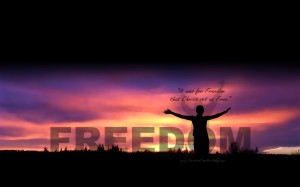radiating the love of God in our daily lives
The French political thinker and historian Alexis de Tocqueville was greatly impressed by what he saw during his travels throughout America in the early 19th Century. First published in 1835 his book Democracy in America extolled its virtues and its dedication to liberty and democracy. In it he wrote “I have a passionate love for liberty, law, and respect for rights … Liberty is my foremost passion. But one also finds in the human heart a depraved taste for equality, which impels the weak to want to bring the strong down to their level, and which reduces men to preferring equality in servitude to inequality in freedom.”[1]

Christ Set Us Free
He observed that what held our democracy in check was the prevalence and intensity of religious belief among its citizenry. Archbishop Charles J. Chaput writes that Tocqueville believed “Religion is to democracy as a bridle is to a horse. And only religion can moderate democracy, because it appeals to an authority higher than democracy itself.”[2]
He writes that religion can only work to influence democracy as long as people really believe what it teaches. “Nobody believes in God merely because it’s useful—and if people try, they make themselves liars. To put it in Catholic terms, Christianity is worthless as a leaven for society unless people actually believe in Jesus Christ, follow the Gospel, love the Church, and act like real disciples with passion and purpose. If they don’t, then religion is just another form of self-medicating.”
Tocqueville’s passion for liberty and freedom was tempered by a fear that without the guidance and constraint imposed upon it by religion, democracy would have the power to kill souls and prepare citizens for servitude. Historian Daniel Boorstin and others have noted how technology has changed the nature of our reasoning and reshaped our discourse by moving us away from a public dialogue ruled by logic, debate, reflection, and typography to a visual and sensory one; emotionally charged and immediate.
Security and freedom have long been the watchwords of the American experience. Unfortunately we no longer rightly understand or address freedom’s noble intent. Today “freedom” means little more than providing each person the maximum number of choices from which one may select. Archbishop Chaput describes the results, “Short-term needs and wants begin to displace long-term reflection and planning. In effect, democracy becomes an expression of consumer preference.”
He believes that the precipitous decline in religious influence upon democracy in America can be attributed to the failure of his generation of parents, educators, and Church leaders to pass along our faith in a compelling way to the current generation, and finally,
“the real reason faith doesn’t matter to so many of our young adults and teens is that—too often—it didn’t really matter to us. Not enough to shape our lives. Not enough for us to suffer for it.
If we want to change the culture of a nation, we need to begin by taking a hard look at the thing we call our own faith. If we don’t radiate the love of God with passion and courage in the example of our daily lives, nobody else will—least of all the young people who see us most clearly and know us most intimately.”
[1] Alexis de Tocqueville, Democracy in America, 1835.
[2] Charles J. Chaput, O.F.M. Cap., Archbishop of Philadelphia, Strangers In A Strange Land, 2014 Erasmus Lecture, First Things, January 2015.
